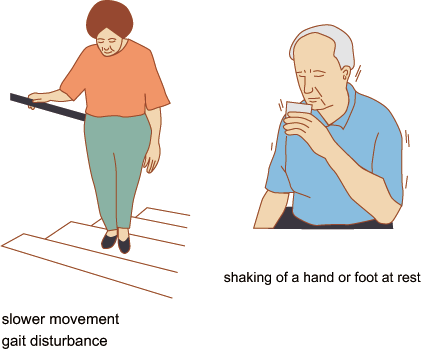- HOME
- For Patients
- Parkinson disease
- Symptom of Parkinson disease
Parkinson disease
- About Parkinson disease
- Symptom of Parkinson disease
- Other symptoms of Parkinson's disease
- Cause of Parkinson disease
- Diagnosis of Parkinson disease
- Treatment of Parkinson disease
- Details of surgical treatment
- Surgical treatment of Parkinson disease
- Timing of surgery
- About our team
Symptom of Parkinson disease
The main features are tremors (shaking) and rigidity (stiffness) of the hands and feet, hypokinesis (slower movement) or akinesis (loss of movement), and impaired postural reflexes (a tendency to fall over).
Symptoms characteristically begin on one side, and progress to other regions. In addition, autonomic nervous symptoms such as constipation and orthostatic hypotension (dizziness on standing) may appear, as well as psychiatric symptoms such as sleep disturbances and depression. In practice, the best-known characteristics of Parkinson's disease are motor symptoms such as: resting tremors (shaking of a hand or foot at rest); lack of facial expression and expressionless voice; cogwheel rigidity (joint stiffness); mincing walk with the body slouched slightly forward; lack of swinging the arms while walking; becoming frozen when starting to walk or in mid-step and being unable to take another step; recovering from freezing thanks to a sound, stepping over a line, or other stimulus; body leaning to one side; and decreased size of writing. Psychiatric symptoms are known to include depressed mood, reduced motivation and initiative, nighttime insomnia, and cognitive difficulties. Autonomic nervous symptoms include complaints of excessive salivation, greasy face, weak bladder, excessive sweating, impotence, and swelling of the hands and feet. Pain in the body may also occur.
[ The main features of Parkinson disease ]








